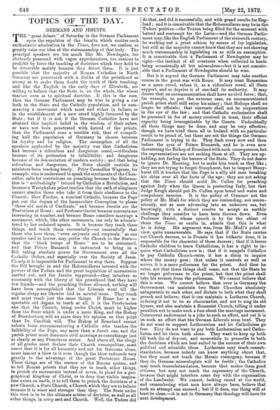TOPICS OF THE DAY.
GERMANS AND JESUITS. do that, and did it successfully, and with grand results for Eng- land ; and it is conceivable that the Hohenzollerns may be in the Tudors' position—the Teuton being filled for the moment with hatred and contempt for the Latin—and the German Parlia- ment may, like the English Parliament of the sixteenth century, be working out a great schism by means of lay legislation,. but still as the majority cannot know that they are not showing much statesmanship in legislating on so wide an assumption_ It is conceivable that a Parliament of Newdegates may be right—the instinct of all creatures when collected in herds being occasionally all but miraculous—but it is not conceiv- able that a Parliament of Newdegates should be wise.
But it is argued the German Parliament may take another course in the great war with Rome. It may treat Romanisni as a mere creed, refuse it, as a ridiculous creed, all State support, and so deprive it of one-half its authority. It may decree that an excommunication shall have no civil force ; that,. for example, to put the extreme case, an excommunicated parish priest shall still enjoy his salary ; that Bishops shall no longer be officials; that convents shall not be corporations in the eye of the law ; and that Catholic ecclesiastics shall be possessed in fee of money received in trust, their official capacity being irrecognizable by the Courts. Undoubtedly all these things may be done, and may be very effective, though we have tried them all in Ireland with no particular result to be proud of, but these are not the things the German. Parliament is trying to do. They flash every now and then before the eyes of Prince Bismarck, and he is even now. threatening the Bishop of Ermeland with such consequences, but the representatives are not seeking them at all. They are up- holding, not furling the banner of the State. They do not desire. to ignore Dr. Manning, but to make him teach as they like ; they are not trying to forget Stonyhurst, but to inspect Stony- hurst till it teaches that the Pope is a silly old man breaking his shins over all the facts of the age ; they are not asking that the Times should scold Dr. Cullen for preaching against Italy when the Queen is protecting Italy, bat that Judge Keogh should put Dr. Cullen upon bread and water and compulsory exercise. It is the policy of Cranmer not the policy of Mr. Miall for which they are contending, not uncon- sciously, not as men advancing into an unknown sea, but knowingly, with a distinct resolve to accept an earthly challenge they consider to have been thrown down. Even, Professor Gneist, whose speech is by far the ablest of those the Times so exults in, admits that this is what he is doing. His argument was, from Mr. Miall's point of view, quite unanswerable. He says that if the State carries. out Church decrees, as in Prussia it has hitherto done, it is. responsible for the character of those decrees ; that if it forces. Catholic children to learn Catholicism, it has a right to in- quire what Catholicism now is ; that if it compels Catholics to pay Catholic Church-rates, it has a claim to inquire- where the money goes ; that unless it controls as well as serves, it is a mere policeman for the priest. And then he votes, not that these things shall cease, not that the State be no longer policeman to the priest, but that the priest shall take his sermon from the policeman. We cannot believe that this is wise. We cannot believe that even in Germany the Government can maintain two State Churches absolutely antagonistic to each other, and dictate to both what they shall preach and believe; that it can maintain a Lutheran Church, ordering it not to be so obscurantist, and not to sing its old. hymns, and also maintain a Romanist Church, telling it under penalties not to make such a fuss about the marriage sacrament. Concurrent endowment is a joke to such an effort, and yet it is on such an effort that the German Liberals seem bent. They do not want to support Lutheranism and let Catholicism go. free. They do not want to pay both Lutheranism and Catho- licism and let them both alone. They want to keep up both till both die of dry-rot, and meanwhile to prescribe to both the doctrines which are best suited to the success of their own political and scientific ideas. Lutherans may teach consub- stantiation, because nobody can know anything about that, but they must not teach the Mosaic cosmogony, because if they do, German mineralogists will be feeble ; the Catholics may teach transubstantiation, because that makes them good citizens, but may not teach the supremacy of the Church, because that might interfere some day with the organisation of the Landwehr. We cannot, looking round at the world, and remembering what men have always been, believe that such an attempt can succeed ; but if it does, one thing will at least be clear,—it is not in Germany that theology will have its next development.


































 Previous page
Previous page